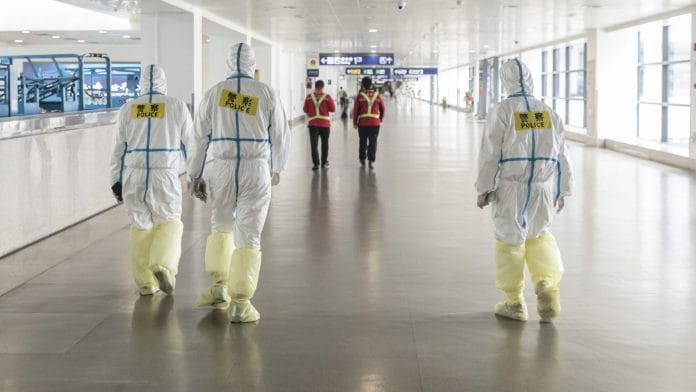Beijing: China reported 35 new imported cases of the novel coronavirus while the death toll from the COVID1-9 infections increased to 3,318 after six more fatalities were confirmed on Wednesday from the virus hit Hubei province, health officials said on Thursday.
China’s National Health Commission (NHC) in its daily report also said 37 new asymptomatic cases of the coronavirus were reported on Wednesday from the Hubei province.
It said 35 new imported cases were reported on the same day bringing the total number of cases with the infection from abroad to 841. While no locally transmitted cases of the virus were reported from the COVID-19 epicentre Hubei Province and its capital Wuhan.
However, six persons died in the province of the disease on Wednesday.
The province also confirmed 37 asymptomatic COVID-19 patients bringing the total to 721, all of whom had been put under medical observation.
Since Wednesday, China began releasing the data of the asymptomatic cases which numbered more than 1,300 following public concern.
Asymptomatic coronavirus cases are those who are tested positive but do not show any symptoms with potential to cause sporadic clusters of infections.
The NHC said all the people with asymptomatic cases would be put into compulsory 14-day quarantine.
In Hubei province, 1,132 patients are still being treated in various hospitals for the COVID-19 of which 280 are still in severe condition and 120 others in critical condition.
Hubei has so far reported 67,802 confirmed COVID-19 cases in total, including 50,007 in Wuhan, state-run Xinhua news agency reported.
As of Wednesday, a total of 81,589 confirmed cases of the COVID-19 have been reported on the mainland, and 3,318 people had died of the disease.
Meanwhile, China has begun airlifting its citizens stranded abroad through chartered flights.
China has arranged nine special flights, three from Italy and six from Iran, to bring 1,466 Chinese citizens home between March 4 and 26, Lyu Erxue, deputy head of the Civil Aviation Administration of China (CAAC) said.
From Iran alone, the special flights flew back 976 Chinese citizens, most of whom were Chinese students, he said, noting that the fourth such flight taking off from Italy is scheduled to bring back 180 Chinese citizens to the eastern Chinese city of Wenzhou.
Another plane departed from Shanghai for London on Thursday morning to bring back 180 overseas Chinese students home, the first such flight orchestrated for Chinese citizens in the United Kingdom, according to Lyu.
For Chinese citizens who remained abroad, 116 tonnes of health supplies have been delivered to the Chinese embassies and consulates in seven countries, including Italy, the United States, France and the United Kingdom as of Wednesday, with the rest of the 300-tonne supplies bound for 12 countries to be delivered before April 10, according to Lyu.
To minimise the risk of the imported cases, the CAAC said it sought to keep international flights per week under 134, including necessary ones to carry Chinese studying or living abroad back home.
The CAAC said it so far has organised 178 planes to send 100 medical experts and workers, as well as more than 2,635 tonnes of supplies to 40 countries worldwide to help fight the pandemic.
Also read: Why asymptomatic coronavirus carriers aren’t as contagious but still a big danger







The communist system, with its tight control of information and its accountability of officials only to their bureaucratic superiors, not to the people below, has been undermining social trust for decades. Citizens do not expect a volte-face in trust just because a deadly virus appears. But without trust, people’s immune system against lies breaks down.In the public sphere, all belief becomes un-grounded belief.
Statements float like clouds, beyond truth or falsity. Questions about a virus – what happened and why? – should be empirical questions that have determinable answers. But not in China, where the problem is not even lack of knowledge so much as lack of a system in which knowledge is possible. China’s officialdom does have a scale on which it measures the value of particular statements, but the criterion is not truth or falsity – it is how well the statement does something that authorities want to see done.
China is ill, yes – but from much more than a coronavirus. The world panics – but only about the virus, not about the deeper illness. China interlocks with the world economically and, in recent years, in some political ways too. If its systemic illness continues to worsen, and to spread by contagion, the world may have to face the existential questions that the illness raises: can civilisation survive without trust? Can government that lacks legitimacy survive indefinitely? GUARDIAN